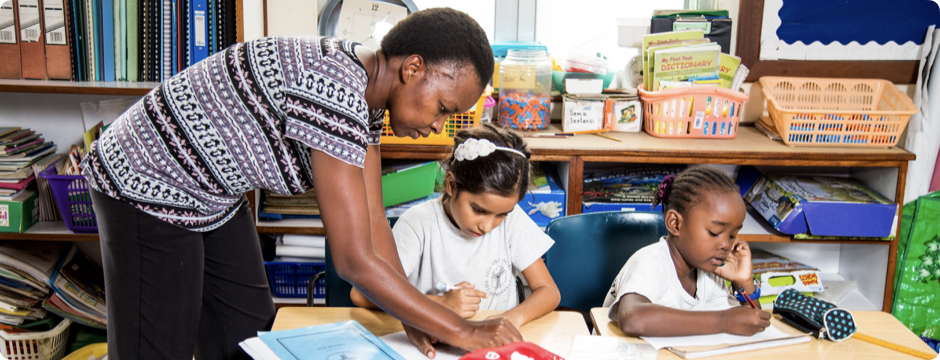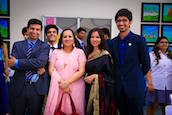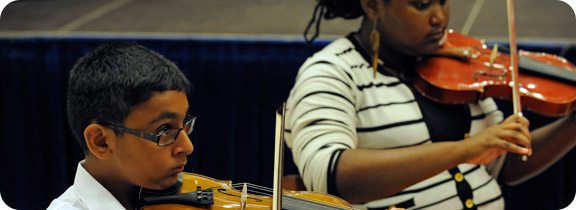
Enrichment Programmes
Enrichment programmes enable students to realise their potential in a variety of settings beyond the classroom. Students develop a sense of self-awareness and an understanding of school and community needs and opportunities. They also learn how to apply their gifts and skills to make a positive impact.
At the Academy, we believe in a balanced, rounded, comprehensive school experience. As this includes both academic and co-curricular experiences, we encourage our students to do their best both in and outside the classroom.
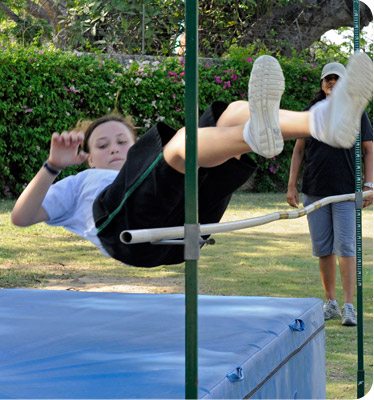 We offer outstanding sports facilities that include:
We offer outstanding sports facilities that include:
- Swimming and diving pools
- Cricket, soccer and hockey pitches
- Basketball and volleyball areas
- Tennis and squash courts
- Dance studio
- Gymnasium
- Athletics tracks
Children with special sporting gifts will be encouraged to develop their talents in every way. Children with special gifts in music, art or drama will similarly be encouraged through opportunities to practise and perform while at the Academy.
Our enrichment programmes are clustered into three main streams, each with a different focus:
Expression
Whether through visual or performing arts, this cluster engages students to think creatively and express their identities and thoughts aesthetically. Through theatre, art, music and drama, students learn to work together and infuse their projects with values and lessons from other parts of their schooling. Individual and collaborative creative projects emphasise growth and development through personal challenge, ultimately resulting in achievable personal goals.
Action
The student as a reflective practitioner is a basic tenet of the action cluster. Through physical sport, both competitive and non-competitive, students are challenged in their physical growth, and learn values such as good sportsmanship, teamwork and ethical behaviour. We encourage them to extend themselves by trying different activities and working with teammates to pass on their knowledge. In line with developing the student as a whole, a healthy lifestyle complements and enhances academic achievement.
Citizenship
At the Academy, we encourage knowledge and understanding of humanity and civil society. Through their involvement in citizenship activities, students gain an understanding of the practical implications of their work and study. By collaborating with community groups on sustainable projects, they develop an appreciation for human rights, human dignity and of how their actions impact the world around them.
To learn more about the Academy's programme, please visit the Academic Programme page.
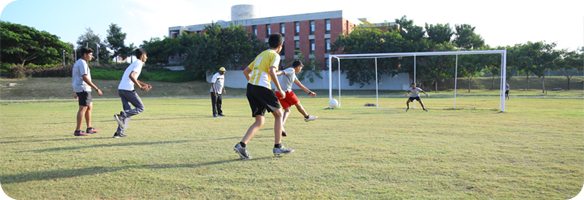
Enrichment Programme
Enrichment programmes enable students to realise their potential in a variety of settings beyond the classroom. Students develop a sense of self-awareness and an understanding of school and community needs and opportunities. They also learn how to apply their gifts and skills to make a positive impact.
At the Academy, we believe in a balanced, rounded, comprehensive school experience. As this includes both academic and co-curricular experiences, we encourage our students to do their best both in and outside the classroom.
 We will offer outstanding sports facilities that will include swimming and diving pools and playing fields for a wide variety of sports and athletics.
We will offer outstanding sports facilities that will include swimming and diving pools and playing fields for a wide variety of sports and athletics.
Children with special sporting gifts will be encouraged to develop their talents in every way. Children with special gifts in music, art or drama will similarly be encouraged through opportunities to practise and perform while at the Academy.
Our enrichment programmes are clustered into three main streams, each with a different focus:
Expression
Whether through visual or performing arts, this cluster engages students to think creatively and express their identities and thoughts aesthetically. Through theatre, art, music and drama, students learn to work together and infuse their projects with values and lessons from other parts of their schooling. Individual and collaborative creative projects emphasise growth and development through personal challenge, ultimately resulting in achievable personal goals.
Action
The student as a reflective practitioner is a basic tenet of the action cluster. Through physical sport, both competitive and non-competitive, students are challenged in their physical growth, and learn values such as good sportsmanship, teamwork and ethical behaviour. We encourage them to extend themselves by trying different activities and working with teammates to pass on their knowledge. In line with developing the student as a whole, a healthy lifestyle complements and enhances academic achievement.
Citizenship
At the Academy, we encourage knowledge and understanding of humanity and civil society. Through their involvement in citizenship activities, students gain an understanding of the practical implications of their work and study. By collaborating with community groups on sustainable projects, they develop an appreciation for human rights, human dignity and of how their actions impact the world around them.
To learn more about the Academy's programme, please visit the Academic Programme page.
Teacher’s Day – 5 September 2016
Academy Junior School will celebrate with a Student Council morning assembly with fun arts and crafts workshops for teachers in the afternoon. Senior School IB Diploma students will be supervising younger classes as part of their CAS (Creativity, Activity, Service) contribution.
Academy Parent-Teacher Sessions – 7 October 2016
Academy Junior and Senior School parents are invited to individual consultations with Grade Leaders and Subject Teachers from 8:30am - 4:00pm to update on first semester student progress for 2016-17.
Aashish Dhammani (Class of 2015): Student into teacher
Read below about alumnus Aashish Dhammani's unique experience as an intern at the Aga Khan Academy Hyderabad.
As an intern at the Aga Khan Academy Hyderabad, you are immersed in the everyday life of teaching and learning amidst some extraordinary intellectuals. As an Academy graduate, I have valued diversity in thoughts, lifestyles and priorities. In the last three months and 14 days, that was put to the test. Every day has been a learning experience; be it with peers or among guests with immense wisdom, my storehouse is now filled with a plethora of knowledge.
Interning under the Dean of Students Aaron Jacob, my internship focused on academic support for the International Baccalaureate (IB) Diploma Programme students in history and the theory of knowledge. Additionally, I was a dorm parent trying to balance a variety of academic and personal issues in student life. In the process, I have developed skills in time management, communicating in a working environment and organisation and resilience under pressure. I was also involved in the facilitation of the Academy's yearbook for 2016, interaction with visitors, assisting in the making of the first IB Middle Years Programme film and various Senior School events.
In my time here, I have grown to value the time, energy and knowledge that goes into the profession of teaching, which unfortunately is not widely respected across our Indian subcontinent. I also realised that as a teacher, you work equally as hard as any student in your class. In the future, my goal will also be to change the stereotypical image of a profession which is as challenging, enriching and rejuvenating as any other valuable profession. Teaching is reliving every day and growing individually.
The Academy is an environment that challenges and nurtures leaders who are fearless, courageous and stewards. I have always envisioned growing up to be one myself. After this internship, I am confident my dream is not too far removed. I will continue to motivate myself to grow, beat the odds, acknowledge diversity and tap into the unfathomable.
I am ready to take on another journey from oblivion to self-discovery!
Sujana Veeramachaneni: Teacher, Assistant Coordinator, Dorm Parent, Mentor
At the Aga Khan Academy Hyderabad, Sujana Veeramachaneni holds more than her official titles of biology teacher and Assistant Coordinator for the Diploma Programme (DP), science teacher for the Middle Years Programme, and dorm parent. Sujana also ensures her students see her as a friend, mentor and pillar of support.
“They should always feel that I’m there for them, no matter the situation, or condition or time of day,” she insists. “Sometimes I get midnight phone calls! They don’t hesitate to approach me.”
Since the majority of DP students live on campus, “My job doesn’t end in the school,” she explains. “We see them as students, and the dorm is like a home for them – so it’s like seeing them at school and at home – same child, different behaviour. Sometimes it’s difficult to draw a line, because we see them here as well as in the school – so that emotional role is with us, also."
“Of course, I have to draw the line – otherwise maintaining discipline is quite difficult – but at the same time, that line is flexible. It’s not firm – but of course, there is a thin line.”
From her side, Sujana believes that she and other staff can learn from the students’ impressive ability to control their emotions at school. “These are all teenagers,” she reflects. “We see them here, inside and outside. Sometimes, even we lose control – but the students don’t have tantrums in front of their teachers. That’s what I learn from them – how to control our emotions.”
Sujana remembers what she went through at her students’ ages, and understands the pressures they face, especially those approaching graduation from the Diploma Programme, who face multiple deadlines, university applications, and academic and personal challenges. “I always put myself in their shoes,” she emphasises, and shares with her students her anecdotes on how she dealt with stress as a student.
At the same time, she acknowledges times have changed. “This generation is under more pressure – we were not exposed to so many kinds of media or diversions. They are dealing with many things at the same time – compared to them, when we were students, we had less complexity in our lives.”
The demanding IB curriculum motivates Sujana as a teacher, even though her switch to a career in teaching was first supposed to be temporary. Sujana holds an MSc in life sciences, with a specialisation in endocrinology, and a PhD in plant physiology. Her research focused on the physio-biochemical parameters of the post-harvest life of roses, after which she worked in post-harvest floriculture in Bangalore. In 2002 she relocated to Hyderabad and started working as a teacher in an international school.
She was drawn to the demanding and challenging nature of the International Baccalaureate curriculum and in 2013 joined the Aga Khan Academy as a biology teacher. Her career at the Academy has been a learning trajectory: “I’m definitely enjoying the professional development here.” She highlights the different positions she has held over the years, as well as gaining confidence over the years in teaching, helping, and guiding Special Education Needs (SEN) students, and the training, support and resources she has received from the SEN specialist at the Academy.
She also appreciates that the Academy itself is always developing – every year different projects, opportunities and ideas are introduced or planned for the future, and she praises the community service that the school ensures students experience: “It is inculcated in the students – the mission itself is very good and strong.”
The Academy is also always learning from its students; if, for example, some students stand out at drawing or music, the staff will learn from those strengths, and apply what they learn with students in the next batch. The curriculum is reviewed every year, and coordinators and deans take sessions every year to improve and upgrade their skills.
Academically, Sujana especially appreciates the opportunities students have to explore their own interests and to learn independently – “That is the beauty of the Extended Essay.”
“It’s very dynamic,” she explains, and she describes the Extended Essay as a “piece of research work, where the student will find their passion” and submit an essay akin to a mini-thesis.
Because “the curriculum has the scope to identify the strength of the student in different ways” and “the student will design their own labs,” independence and the opportunity to follow one’s own interests is important: “Every student’s choice is different,” she says.
As their teacher, Sujana enjoys the intricacies of guiding the students individually and tailoring her teaching style to their interests and strengths. This year, she is supervising six students, whose self-selected Extended Essay projects explore a range of topics including hydroponics, the greenhouse effect and carbon dioxide concentrations, mushroom cultivation, seed germination, and the effect of music on the growth of plants.
Sujana enjoys being able to show her dynamic, expressive side at the Academy and the freedom of teaching styles and resources that is not always available at other schools. But she finds even more satisfaction in mentoring than in teaching, and it is most rewarding when her students achieve their goals – obtain university admission, get their diploma, or overcome an obstacle when they thought they couldn’t cope, but were “able to achieve something with our guidance.”
She emphasises the need to be adaptable and compassionate towards her students, both for academic and emotional support. “You have to tailor yourself to the needs of the students because some students, you really have to encourage them, motivate them, and some students – at times you have to be firm, strict,” she explains. “I change myself, as per their needs.”
When asked what she envisions for her students’ futures, Sujana replies that she wants them to identify their passions and to continue doing what they like. “I want them always to be confident.
By Natasha Pirani
Parent-Teacher conference
For DP2 parents only March 18 from 4:30pm – 6:00pm
Senior School Parent-Teacher Conferences
26-27 March 2015
Parent-Teacher Conferences
08 October: Years 1-3
08-09 October: Senior School
09 October: Years 4-5
